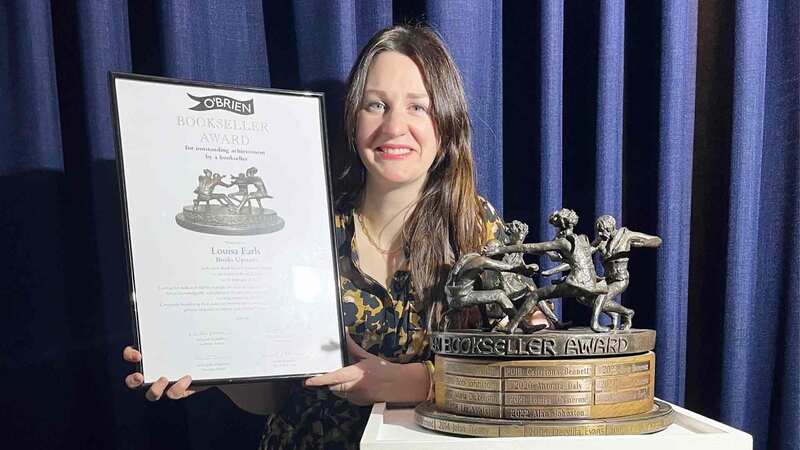You are viewing your 1 free article this month. Login to read more articles.
Predictions: what lies ahead for the book trade in 2025?
Tom Weldon
Chief executive officer, Penguin Random House UK (PRH UK)
As I see it, there are two urgent priorities in 2025, which are fundamental to the future of our industry and we must work together to navigate and tackle them.
First, AI will continue to develop at breakneck speed with the necessary regulation lagging behind. We will continue to work closely with the Publishers Association to ensure that the intellectual property of our authors is vigorously defended. We are disappointed and concerned by the Government’s proposal for a copyright exception for data mining for AI use and see this as a significant risk.
Second, while online communities such as BookTok continue to drive demand, we were served a stark reminder of the decline of reading for pleasure among children with the National Literacy Trust’s (NLT) latest reading survey data. This issue must take a front seat in 2025, and collaboration across the ecosystem to tackle this with an urgent focus is now critical. As a business, we will continue to focus our energy and investment on our flagship social impact programmes Libraries for Primaries and Lit in Colour, working in partnership with our charity, public and private sector and publishing partners.
We are excited to celebrate Penguin’s 90th anniversary in 2025. Penguin has weathered many storms through the years and navigated new inventions and technologies and yet the format of the book has endured. As people seek comfort, clarity and understanding in a challenging world, it seems to me that books and the stories and ideas within them are just as important now as they were 90 years ago, and at Penguin Random House we remain focused on our founder’s original vision to publish books for everyone.
David Shelley
Chief executive officer, Hachette UK and Hachette Book Group
In 2025, I think we will see a continuation of trends that have been building for the past few years. One of these is consumer desire for collectible editions (sprayed edges, exclusive covers, extra material). Another is a continued – and, to my mind, welcome – blurring of industry fiction genre categorisations. I think there will be more bestsellers that are neither thriller nor romance, nor fantasy nor literary, but contain elements of all.
Over the past few years we have seen growing sales for adjunct products such as gifts, games and stationery. I think that trend will continue as consumers, who are on their phones most of the time, increasingly appreciate analogue pleasures.
To that point, a hope rather than a prediction in 2025 is that as an industry we can help encourage more people to read aloud to children and start them in the habit of reading for pleasure. We know from the recent NLT statistics among others that reading for pleasure is at a 20-year low for kids and I think we have a duty to them, and to the future of our industry, to try to change this. The Hachette Raising Readers programme will be a small part of that and I hope we can coordinate a lot more activity across publishers too.
Charlie Redmayne
Chief executive officer, HarperCollins
The latest statistics on children’s reading habits are dispiriting, which is why we will be building on Farshore’s 12 years of research and making reading for pleasure a real focus for the UK business in 2025. We will be working to help families, teachers and others instil a love of reading to improve children’s wellbeing and life chances and will share our plans for "A Year of Reading for Pleasure" shortly.
In a move that feels more anti-growth than pro-business, the increase to employer’s national insurance (NI) announced in the Budget will have an adverse impact on businesses in 2025, not least those in our industry less able to absorb increased costs in a challenging economic environment.
From NI to AI. The use of AI in our industry is evolving rapidly and we will continue to experiment and innovate. Our aim is always to reach the widest possible audience for our authors’ work and to ensure appropriate remuneration for it. New channels and new tech with effective protections and an open mind help us achieve this, as we have seen with Spotify, which is bringing new listeners to audiobooks and delivering revenue for our authors and the business.
Similarly, the BookTok effect and fan desire for beautiful special editions continues to drive sales and innovation. Our Locked Library is going great guns and we have expanded the concept globally with the introduction of Forbidden Wing. Just over a year ago the HarperCollins TikTok shop opened, the first of its type, and this year we saw impressive revenue growth and were the only books merchant to be recognised at the TikTok Shop awards – I suspect we won’t be alone for long.
Paul Kelly
Chief executive officer, DK
As we look ahead to 2025, the publishing industry stands at the crossroads of innovation and challenge. Growth in audiobooks and beautifully designed titles in all genres will continue, as readers seek immersive experiences and tactile connections, meanwhile vibrant author, illustrator, creator and brand fandoms will remain strong. Thinking globally, our role is to expand distribution through new and existing channels, reaching readers wherever they are, while supporting our most important champions, booksellers.
Yet, there are worrying trends in young readers’ engagement that demand action. Access to books is essential, but it is not enough. We must invest in community-based initiatives like the Summer Reading Challenge and ensure libraries receive proper funding to inspire young minds. The British Book Awards inaugural Library of the Year award, which DK is proud to sponsor, will highlight the critical role libraries play and offers a chance to celebrate and promote their invaluable work.
This year will undoubtedly keep us on our toes. Balancing increased costs, particularly around distribution, with accessible pricing, remains a challenge. And geopolitical factors could continue to put pressure on the supply chain. Navigating these complexities will require agility, creative solutions and strong international partnerships.
AI remains a transformative force, offering opportunities to enhance discoverability, streamline workflows and better connect books with audiences. However, publishers must keep authors’, illustrators’ and photographers’ interests at the forefront, balancing innovation with ethics to ensure the industry’s long-term health.
Nigel Newton
Founder and chief executive, Bloomsbury Publishing
2025 will see the promulgation of the Digital Markets Competition & Consumers Act with new powers given to the Digital Markets Unit at the Competition and Markets Authority. This will be a great day for publishers who are worn down by threats from online retailers to delist their books or otherwise interfere with their sales if capitulation to the latest terms demands does not happen.
With great power comes great responsibility but a survey of PA members show the strength of feeling on this issue. A regulator can help change that just as the CMA have done in the grocery industry where supermarkets abused their power over suppliers.
Culture wars are certain to continue to be waged in 2025 with people making accusations of each other which are simply not true. Book publishers will have to have courage in dealing with this as it is only likely to intensify under a Trump presidency changing the world balance of power and AI spreading false information.
Ian Chapman
Chief executive and publisher, Simon & Schuster UK and International (S&S)
We expect to see continued caution from consumers into 2025, but trends such as personalisation, stretching and blending of genres, healing fiction in translation and seasonal publishing will give consumers evermore enticing reasons to purchase. We envisage shifts to shorter books in some areas of the market, as well as increased variety of verse novels and poetry gaining traction alongside graphic novels.
With reading for pleasure in decline for children, we anticipate the conversation and content to evolve as publishers sell the reading experience to both the children and adult markets. There is an opportunity for audio to play a significant role in this as publishers look to experiment and reach new or casual readers through Spotify and audiobooks now sold through Amazon Music.
As a company, we remain committed to the Inclusivity Action Plan, with a continued effort to acquire and hire diversely, as well an ongoing commitment to work with a multitude of diverse organisations to ensure that the change we all seek is permanent and meaningful.
Underlying all of this is the increasing capabilities of AI and where it may take us, both the opportunities and the risks. As the AI and Copyright Consultation was published just this week by the government, it remains a crucial time for the industry as we look to safeguard the interests of our authors and their work.
Continues...
Joanna Prior
Chief executive officer, Pan Macmillan
The greatest challenge facing us next year is the sharp fall in children reading for pleasure. In November, The National Literacy Trust published a report showing that only 35% of eight to 18-year-olds enjoy reading in their spare time. It has been encouraging to see a broader industry response to these figures, with the downward trend being recognised not only as a challenge for the children’s sector, but an existential threat to the book industry as a whole. I hope we will see the government prioritise reading for pleasure in its curriculum and assessment review, but as publishers we must work together to engage younger generations of readers.
It is likely no coincidence that, along with children’s enjoyment of reading, representation of diversity in children’s books is in decline, as reported by the CLPE. This recent u-turn is deeply dispiriting: we can and must do better. The task at hand now is ensuring that we are set up to support long-term, sustainable progress: that we are attracting but also developing talent from all backgrounds. As BA president Fleur Sinclair put so well in her keynote address at this year’s FutureBook, we must start creating the brands of the future to stay relevant.
Of course, 2025 will also be a pivotal year for AI. We will begin to better understand how we can harness its power to the benefit of our authors and illustrators while protecting their IP and mitigating biases. As publishers, our role has never been more important: we must continue to inspire empathy and understanding, promote debate and the exchange of knowledge and ideas through our books, and ensure that we are publishing for the widest possible audiences, leaving no-one behind.
Richard Village
Founder and publisher at indie press Foundry Editions
It’s been a great first year for us, with wonderful support and enthusiasm from colleagues across the spectrum of the book industry. In spite of the inevitable challenges that come with being a newly launched indie press, what struck us the most has been the appetite amongst booksellers for something new, something different, something unusual that their readers and browsers could get behind. We’re positive this trend will continue well into 2025. We believe next year will see a growing demand for books that go beyond the traditional bestseller lists. We envisage the book ecosystem will adapt accordingly, to find ways to be more open to this trend, and not so monolithically dependent on the big houses and big titles.
From booksellers and readers alike, 2025 will see an upward trajectory in terms of demand for literature in translation, which has been really solid in 2024 already. Han Kang’s brilliant Nobel win confirmed and progressed the interest in literature from across the globe, and was another great milestone for works translated from Asian languages. Sales of translated fiction are indeed continuing to grow – as we’ve seen in 2024 with Asako Yuzuki’s incredible novel Butter ranking at number 4 in the Nielsen UK top 10 bestsellers (week ending 14th December).
To cater for this appetite, we foresee publishers will have to forge stronger relationships with international colleagues – something we’ve been learning to do ourselves over the last year. We can speak for a handful of countries, but we have had really good dialogues with houses big and small in France, Italy and Spain about the understanding the realities of the UK and managing their expectations to work within that framework. Going forward, we will see more publishers having more meaningful conversations about royalty rates and how to work with literary translators, who are continuing to expand their crucial role in the industry, so we hope to see their work being more and more recognised in 2025.
Kate Skipper
Chief operating officer, Waterstones
It’s always exciting to come out of Christmas and into some fantastic publishing and Rebecca Yarros’ Onyx Storm will see customers queuing at the door, providing a real buzz to the start to the year.
We’re looking forward to a resurgence in non-fiction publishing, as publishers respond to the continued popularity of podcasts and many people seeking to be informed on matters ranging from the inspirational to the arcane. Audiences are not only seeking entertainment but knowledge and enrichment.
The focus on improving children’s engagement with reading for pleasure is also very welcome. The chart success for brilliant series such as Bunny vs Monkey demonstrates the appetite for early and middle grade graphic novels which are expanding the market and creating new readers.
Events seeking to connect books and authors directly to readers and local communities are another small part of the efforts here. We are excited about continuing interesting and varied programmes of events across our shops and in particular the launch of our inaugural Children’s Book Festival in Lincoln next year will be a highlight for us.
Backlist remains the engine to the industry, underpinning so much of what we all do, despite many glitzier headlines. Thankfully, publishers are continuing to choose to invest in high production values vital to ensuring these books remain desirable and relevant, rather than allowing brilliant books to slip into POD obscurity.
Whilst AI will inevitably continue to spew out self-published drivel, we watch with interest to see how publishing can harness its power more productively.
Meryl Halls
Managing director, Booksellers Association of the United Kingdom & Ireland (BA)
The new government seems to have a genuine desire to see high streets thrive, and has already signalled thoughtful policies around digital dominance, business rates and communities, but the transition period – especially in the rates arena – will be painful for some in the short term. Medium term, impacts on the cost of doing business from the Budget will kick in and may put the brakes on bookshop expansion, and will require booksellers to run ever faster to keep up.
Brexit fallout will continue to make life difficult in relation to the EU, and for our Irish members, Amazon’s arrival and the ongoing impact from school-book provision will continue to test the mettle of our Irish members. At the Booksellers Association, we obviously have plans to continue to advocate for bookselling as loudly as ever across government and the industry, with plans to help diversify – and drive excellence in – bookselling.
It is likely we will see a step change in the availability in audiobook and e-books for the indie sector, which could help drive sales. In geopolitics, uncertainty will reign as the Trump presidency beds in. Hold onto your hats.
Dan Conway
CEO of the Publishers Association
Next year will start with a bang in global political terms with Donald Trump taking office in January and with German Budestag elections expected for February. Publishing is a truly global industry and we all need to have an eye on global matters to ensure the free exchange of ideas and content around the globe. We should hope that, looking further ahead, COP30 is a success internationally and that we don’t step back from our global responsibilities as relates to sustainability.
Closer to home, of course regulation of artificial intelligence is the generational fight we’re in as publishing and as the wider creative industries. The UK government consultation runs until February and there will likely be primary legislation to contend with later in the year. This will continue to be hugely prominent next year and carries significant risk, but also potentially substantial reward should we get it right.
More broadly, you will hear more from us and the wider reading ecosystem on the crisis in children’s reading. We want to work collaboratively with all parties to try and turn the tide and make sure we equip society with the readers, learners and scholars of the future.
It’s a privilege for us at the Publishers Association to represent publishing. We are looking forward to supporting and championing the industry over the coming year.
Anna Ganley
Chief executive, Society of Authors
My first year as chief executive for the Society of Authors was a busy one, and 2025 doesn’t look any quieter. Our policy and campaigning work will continue apace, dominated, of course, by generative AI.
As the Chair of the Creators’ Rights Alliance (CRA) and working with the new Creative Rights in AI Coalition (CRAIC), we’ll lobby hard for UK copyright laws to be respected and enforced by government. This is a once in a generation opportunity to get this right. We’ll be responding to the government consultation pressing for much-needed transparency, choice, control and compensation for rights holders. And we’ll continue to advise our members about the risks and opportunities of AI so that they can make informed decisions about their work.
But it’s not just about AI. We’ll continue to campaign about the value of human creativity throughout the books ecosystem, for fairness and recognition for all creators behind the books published.
As we look ahead to 2025, we’re acutely aware of falling author incomes, and as our CREATOR campaign for fair contract terms marks a 10-year anniversary, we’ll look at what’s changed in the last decade for authors. We’ll also continue to press government for improvements to the tax, benefits and legislative landscape for creative freelance workers.
With the backdrop of the decline in reading and literacy, the defunding of libraries, and the government backing of platforms like Oak Academy, we have our work cut out for us.
But my hope for 2025 is better author care. Whether that’s pressing for improved communication with authors, and greater transparency about the publishing process; to upholding our industry values; or looking at how we can better support and include a greater range of voices throughout our publishing industry. At the Society of Authors, we’ll do what we’ve done for the last 140 years: advocating, connecting and empowering writers, illustrators and literary translators.
Nicole Vanderbilt
Managing director of Bookshop.org UK
At Bookshop.org, our mission is to support independent bookshops and ensure they survive and thrive in the age of ecommerce. We predict that in 2025, indies will defy the odds once again, despite being up against even more difficult conditions thanks to the Autumn budget imposing double business rates and higher National Insurance. Indie bookshops will need to find new ways to grow reader support online and off – be that through growing their digital footprint or more enhanced in-store experiences. We know they will continue to play pivotal roles in their communities and in the lives of readers.
In 2025, our customers are likely to seek more books about politics or featuring political satire, which have also been popular over the year just gone – possibly due to the turbulent times we’re living in. We foresee also selling more translated fiction, more short books, more titles that focus on nature, and more sci-fi novels. We’ve started to see a decline in air fryer cookbooks, which have been selling well last year, but we anticipate an uptick in sales of books covering fermentation and general gut health.
Jasmine Richards
Founder, Storymix
In 2025, we will continue to see the rise of the puzzle book and an increase in books that see the gamification of narratives. We still need to figure out how to get children to fall in love with reading again. We might need to meet them where they are in the digital realm and we need more stories that are challenges as well as adventures. Above all, giving the reader choice will be the key to hooking them as we encourage them to play their way through the story. This will be a key focus for us at Storymix and a puzzle we are excited to solve!
Peter Phillips
Chief executive, Cambridge University Press & Assessment (CUPA)
Regulators, publishers, tech companies, authors and lawyers will spend much of the year grappling even more with generative AI, especially as the UK government consults on a legal framework for AI and copyright. Scholarly research and high-quality non-fiction are profoundly valuable – even more so as large language models (LLMs) seek out exactly this type of content, having already taken much from the open web.
In this context, it is vital that legal frameworks give real priority to transparency for authors and readers, control for rights holders and lawful access for AI developers. Cambridge has a clear approach: we have asked our book authors whether they wish to "opt-in" to their work being used by potential licensing agreements with AI companies, rather than them having to "opt-out" of their work being scraped by LLMs. How we respond to these challenges will shape our societies and creative endeavours far beyond 2025.
Selina Brown
Children’s author and chief executive officer, the Black British Book Festival
The publishing landscape in 2025 will, I hope, move beyond simply acknowledging the importance of diverse voices and actively commit to embedding them at all stages of the industry. Over recent years, we have seen encouraging progress with more diverse authors securing mainstream deals. However, the latest CLPE (Centre for Literacy in Primary Education) report still highlights a worrying decline in the representation of racially-minoritised characters in children’s books, reminding us that positive change remains fragile and easily reversed. This serves as a wake-up call: diversity must be ongoing, active and intersectional.
As CEO of the Black British Book Festival, I have seen firsthand how readers respond to stories that authentically reflect our multifaceted society, including those from Black, Asian, Indigenous and other historically underrepresented backgrounds. To truly move forward, publishers must invest more deeply in nurturing emerging talent across a wide spectrum of cultural, linguistic and social identities. This means not just signing a handful of “diverse” authors, but ensuring these authors receive robust investment in marketing, editorial support and long-term career development that is equal to their white peers.
On a wider scale, I would like to see more professionals from diverse backgrounds stepping into decision-making roles – CEOs, marketing managers, editors, agents, sellers – shaping what stories are told, who gets to tell them and where they are shared. We need decision-makers who understand and value a range of experiences, ensuring that diverse stories are not sidelined as a niche category and DEI is not just a lovely buzz word.
Claire Wilson
Literary agent and director, RCW Literary Agency, and president, Association of Authors’ Agents
At the AAA, we look ahead to another year of crucial discussions around the enforcement of copyright law in the field of generative AI. The opening of a government consultation on this issue is welcome, and we encourage authors and agents to engage with the conversation; we will continue to support and advise our membership on how best to do so.
Equally important, the NLT continues in its efforts to put a library into every primary school in the UK, and this is a campaign that every one of us should be supporting if we are to see future generations of readers to come. As we look to the year ahead for our authors, we will be keeping in mind the increased pressure on their incomes while publishers cite tightening margins, and will be looking to explore the growing spectrum of licensing opportunities across a range of media.
The importance of high-street retailers remains at the forefront of our minds as we continue to see the importance of beautiful physical editions of beloved books. We celebrate Waterstones driving breakout success, including increasing opportunities for authors in translation. UK authors and illustrators meanwhile remain vitally important to the cultural landscape worldwide, and we will be championing their tireless and brilliant work throughout the year to come.
Barbara Hayes
Executive director and chief executive, Authors’ Licensing and Collecting Society (ALCS)
The government’s AI consultation will be at the forefront of our minds as we enter 2025. The consultation promotes greater transparency regarding the use of copyright works for training AI systems (which we know writers want) but the Government’s favoured option puts the onus on writers to opt their works out of something that they did not ask for in the first place. We will be working with industry colleagues through the Creative Rights in AI Coalition (CRAIC) and our writer members to frame fair and workable solutions based on licensing under existing copyright rules.
Ensuring writers are paid when their works are used is at the heart of what we do, so ALCS will also be busy with the development of both SCOOP (a cross-industry initiative to sustain news journalism in the UK), and our campaign for a Freelancer Commissioner, a dedicated role within the Government to support the specific needs of the freelance sector. Our research into authors’ earnings, and pay and contracts for freelance journalists, show that this a sector in serious need of assistance.
Finally, income for writers for secondhand book sales is sporadic at best, so we were delighted that last year Bookshop.org launched Bookloop, which aims to offer an ethical alternative to secondhand book sales, and we look forward to paying writers for the use of their works through this initiative. If any other booksellers are keen to get involved, we are all ears!
Silé Edwards
Literary agent, Andrew Nurnberg Associates
Trying to predict how 2025 will look after the chaos that was 2024 feels unwise, but after a year of seismic shifts culturally, politically and economically I feel safe in saying that the next year for publishing will largely about seeking stability. We probably will not see this at the top end of the year – we are still living in the aftermath of the pandemic and multiple ongoing global humanitarian crises, while also tackling new challenges in the cost of doing business – as well as the ever-rising cost of living which will inform the conditions for our industry as well as the types of books that readers are looking for.
There will likely be a huge focus on Reading for Pleasure, as the NLT stats were hard to ignore, and I am cautiously optimistic that, in addition to a rise in industry initiatives, this will mean more ambitious (and less risk averse) acquiring with the aim of reaching a wider range of people who might not even realise they are readers.
We desperately need some introspection which seeks to redress the backsliding in ethnic diversity reported in our workforce and published authors, so I hope to finally see meaningful strides and investments being made towards permanent, positive progress.
Eve Wersocki Morris
Author and freelance children’s book publicist, EWM PR
In 2024, NLT reported that two in three children aged eight to 18 say they don’t enjoy reading. The popularity of children’s graphic novels and highly-illustrated fiction exemplifies the continued need for more accessible books to combat the lure of digital pursuits. Publishers are responding to this demand and I expect 2025 will bring more graphic novels – new series and graphic novel editions of big brands – and more interactive books; we have had a wave of mystery puzzle books for kids so perhaps next we will see a resurgence of "choose your own adventure" books.
Being dyslexic, I have been cheered to see Bloomsbury launch their dyslexic-friendly editions. Personally, I do not see why dyslexia-friendly fonts cannot be considered for all books. I am hopeful that there will be a positive change from retailers to normalise dyslexic-friendly adult books. Publishers have it in their power to make a real difference and challenge the stigma of dyslexia among adults.
This year will bring new challenges for digital comms teams. After the mass exodus from X, will the publishing community find a home in BlueSky? For the first few months, I foresee a lot of posting on multiple platforms until a forerunner is established.
Ellis Poolford-Moore
Senior audio Acquisitions manager, Bolinda
2025 in the audiobook space is going to have a very close eye on AI integration – something that’s already been one of the hottest topics of 2024. With the sheer volume of audio production rising drastically, AI integration cannot be overlooked – but what is more important is that quality should not be compromised for affordability.
The way which we consume audio will also continue to be a key focal area, with big players looking at new ways to compete with their offering of audio content, it’ll be interesting to see the actual effect this has on the number of listens.




















